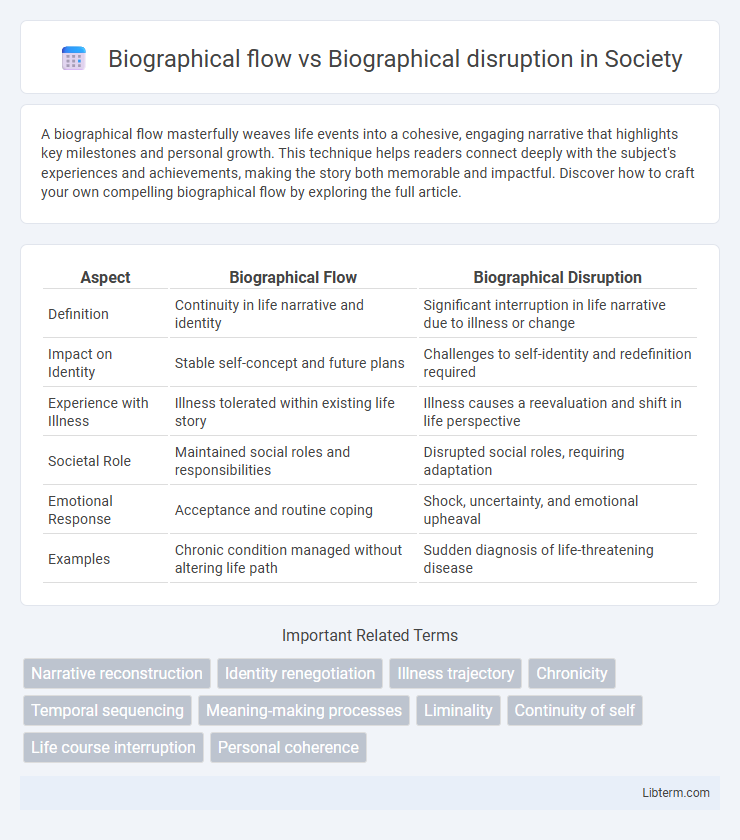A biographical flow masterfully weaves life events into a cohesive, engaging narrative that highlights key milestones and personal growth. This technique helps readers connect deeply with the subject's experiences and achievements, making the story both memorable and impactful. Discover how to craft your own compelling biographical flow by exploring the full article.
Table of Comparison
| Aspect | Biographical Flow | Biographical Disruption |
|---|---|---|
| Definition | Continuity in life narrative and identity | Significant interruption in life narrative due to illness or change |
| Impact on Identity | Stable self-concept and future plans | Challenges to self-identity and redefinition required |
| Experience with Illness | Illness tolerated within existing life story | Illness causes a reevaluation and shift in life perspective |
| Societal Role | Maintained social roles and responsibilities | Disrupted social roles, requiring adaptation |
| Emotional Response | Acceptance and routine coping | Shock, uncertainty, and emotional upheaval |
| Examples | Chronic condition managed without altering life path | Sudden diagnosis of life-threatening disease |
Understanding Biographical Flow
Understanding Biographical Flow involves recognizing how individuals experience life events as continuous and coherent, maintaining a stable narrative identity despite changes. This concept emphasizes the preservation of personal meaning and the integration of experiences into an ongoing life story. It contrasts sharply with Biographical Disruption, where events are perceived as interruptions challenging the coherence of one's identity and life trajectory.
Defining Biographical Disruption
Biographical disruption refers to the profound interruption of an individual's expected life trajectory caused by a significant illness or life event, altering their personal narrative and self-identity. This concept highlights how chronic conditions challenge previously held assumptions about health, future plans, and social roles, necessitating a reevaluation of life meaning and priorities. Unlike biographical flow, which implies the smooth continuation of life events, biographical disruption emphasizes the abrupt and transformative impact on an individual's biography.
Key Theoretical Frameworks
Biographical flow refers to the continuity and consistency in an individual's life narrative, emphasizing stability in identity and experiences over time, foundational in life course theory. Biographical disruption, a key concept introduced by Michael Bury, highlights how chronic illness or significant life events interrupt an individual's expected life trajectory, reshaping self-identity and social roles. These frameworks operate within medical sociology to explore how personal biographies are constructed or reconstructed in the face of health challenges.
Origins and Historical Development
Biographical flow refers to a continuous and stable narrative of a person's life, emphasizing consistent development and coherence in identity over time. In contrast, biographical disruption highlights moments where illness or significant life events interrupt this continuity, causing a reevaluation of self and life trajectory. The concept of biographical flow emerged from psychological and sociological studies on identity, while biographical disruption was first extensively theorized by Michael Bury in 1982 to explain how chronic illness disrupts personal narratives.
Biographical Flow in Lifecourse Narratives
Biographical flow in lifecourse narratives emphasizes the continuity and coherence of an individual's identity and life story despite changes and challenges. It reflects a stable sense of self and ongoing progression through life stages, where experiences are integrated smoothly into the personal narrative. This concept contrasts with biographical disruption, highlighting resilience and the ability to maintain a unified lifecourse narrative amid adversity.
Triggers and Causes of Biographical Disruption
Biographical disruption occurs when unexpected health issues or life events, such as chronic illness diagnosis or sudden disability, interrupt an individual's anticipated life trajectory and personal identity. Triggers commonly include serious medical conditions like cancer, stroke, or injury, which challenge previously held assumptions about life continuity and future plans. Causes of biographical disruption often stem from the loss of physical function, altered social roles, and the psychological impact of coping with new limitations and uncertainties.
Impact on Identity and Self-Perception
Biographical flow supports a continuous, coherent sense of identity by integrating life events into an ongoing narrative, which stabilizes self-perception and reinforces personal meaning. In contrast, biographical disruption interrupts established self-concepts, often leading to identity reevaluation and a fragmented self-view as individuals confront unexpected changes. This disruption challenges prior assumptions about the self, requiring adaptive processes to reconstruct identity and restore psychological equilibrium.
Coping Mechanisms and Adaptation
Biographical flow refers to the continuity of life events where individuals maintain a stable sense of identity despite challenges, often employing coping mechanisms such as routine maintenance and positive reinterpretation to adapt seamlessly. In contrast, biographical disruption involves a significant disturbance of the life narrative, prompting individuals to develop new coping strategies like seeking social support, reframing experiences, and reconstructing self-identity to manage uncertainty and change. Adaptation in both concepts hinges on psychological flexibility, resilience, and the capacity to integrate health-related or life-altering events into existing or revised personal narratives.
Clinical and Sociological Implications
Biographical flow refers to the continuous, stable progression of an individual's life narrative, crucial for maintaining psychological well-being and social identity in clinical settings, while biographical disruption describes the interruption caused by chronic illness or significant health events, leading to identity challenges and altered social roles. Clinically, recognizing biographical disruption aids in designing patient-centered care that addresses not only physical symptoms but also emotional and psychosocial adjustments, promoting coping strategies and resilience. Sociologically, understanding these concepts emphasizes the need for supportive social networks and community resources that facilitate reintegration and adaptation, mitigating the isolation and stigma often associated with disrupted life trajectories.
Future Directions in Biographical Research
Future directions in biographical research emphasize integrating digital technologies to map biographical flow and disruption over time with greater precision. Researchers are exploring longitudinal studies using big data analytics to capture dynamic life patterns and interruptions across diverse populations. Emerging interdisciplinary approaches aim to deepen understanding of how sociocultural factors influence the continuity and rupture in personal narratives.
Biographical flow Infographic

 libterm.com
libterm.com